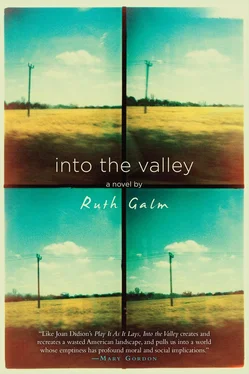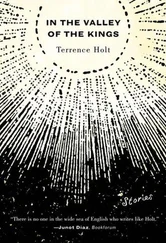She watched a beer can float by on the river. A faintly sulfurous scent wafted up from the water. She got up and made her way back to the car.
Hungry, she drove back to the town with the burger stand. It was a small shack, rusted-metal outdoor seats and a window counter. A collarless cat bolted around the corner as B. approached. Through the window she ordered a cheeseburger and a Coke from a thin teenage boy. She did not have enough money in her purse, so she excused herself to the dingy bathroom around back and took one of the fifties from her bra strap. But when she returned the teenage boy stared at the bill on the counter. “We don’t have enough change for that, ma’am.” The boy and B. both flushed. She slipped the stolen bill back into her purse. When she turned to leave, the teenager called her back and said under his breath he’d put it on the house.
There was a group of men sitting a few seats down. They were not much older than she, perhaps in their mid-thirties, with cloudy forearm tattoos, angular and leathered skin from too much sun. They talked and laughed tersely. B. sat down at one of the outdoor tables and picked up a left-behind newspaper to appear occupied. She flipped to a picture of the first lady and the president. B. had always preferred Lady Bird to Jackie, who was too aloof and enigmatic. Lady Bird with her dull matching suits and hair correctly curled would understand B.’s growing concern about the young women with unstyled hair. She would be equally dismayed at the unmatched clothes, the sitting in parks and dancing to guitars and smoking marijuana, the absence of stockings. And Lady Bird, she knew, would be most disturbed by the hazy blitheness in their eyes, as if beatitude came from disarray, as if one could go through life with nothing else expected of them.
B. sensed the men watching her in between their laconic exchanges.
Yes, she felt someone like Lady Bird ought to take the situation of the unstockinged young women in hand. As a national epidemic, a degenerative trend.
B. was gazing on the photo, lost in these thoughts, when one of the men was suddenly next to her.
“You lost, miss?”
“No.” She searched the pick-up window for her cheeseburger. The window was shut, the teenager gone.
She saw the man glance at her ring finger. “That your car?” He flicked his chin at the Mustang. He had seen her park it.
“Looks new,” he said.
“It is.”
“Give you a good run, I bet.”
“Yes.”
Her cheeseburger came up then. She excused herself to the counter and thanked the boy again, who blushed and mumbled something back. He had forgotten the Coke; she could not bring herself to ask for it. She pretended to start eating and the man went back to his friends, his smell of gasoline and sweat lingering. She ate a part of the bun and a few bites of meat but lost her appetite and folded the wrapper. The man came back.
“You travelin’ alone?” A look of amusement crossed his broad face. He leaned against the counter and looked directly at her.
She noticed the narrowness of his hips in his leather belt. She wondered if the narrowness made him feel light, easy to move. She did not want to look him in the eye. “Yes, I am.”
“Well, I can give you directions if you like.”
“I don’t need any directions, thank you.”
The deep lines at his mouth made him seem as if he was smirking at all times. “Well, I just thought. . Well, a pretty lady like you might need some assistance.”
“No thank you.”
The smirk remained. He tipped his cap. “Well then, safe travels.”
She gathered her purse and walked past him back to her car, feeling his eyes on her. She fumbled for the keys and started the engine and as she was about to back out she saw the men watching her still. Without thinking, she killed the engine. She exited the car and walked up to the man.
“I know exactly where I’m going, actually. I don’t need any directions.”
She could hear sniggering. “You said that.” The man tipped his cap again. “Didn’t mean to offend, miss.” She went back to the car and sat behind the wheel and stared at them. She stared, losing track of time, until they began kicking the ground self-consciously. Then she started the engine again and backed out of the parking lot.
Back at the levee road, she crossed a metal drawbridge to the other side of the river, running beside hundreds of trees with endless ghostly pods (she drove into the orchard itself and decided they were almonds). She came on a town the length of two blocks, with brick façades and an old hotel. Then farther down the levee beyond hunched old walnut trees, a dry feed store, a meat market, an old stone church.
And a bank.
She brought her focus back to the river. It was low, barely grazing the middle of the levees, still and brown as earth.
She followed the walnut trees along the road until she got too close to the capital, then veered away from the river and back out into the fields.
“How do you act?” she’d asked him. “When you do it?”
“Look,” he said, “the truth is, shopkeepers, tellers — chicks especially, I hate to tell you, baby — they ain’t expecting them to be fake. They’re thinking about the transaction, about getting their cut or doing their job, and fake money looks like real money, and fake checks look like real checks, so why would they think any different? Why would they suspect anything unless you gave them a reason to?” As he spoke an excitement and urgency grew in his voice, as if he were teaching a young boy the fundamentals of a ball game. “You gotta remember: you’re the one who’ll give it away, not the paper. I don’t go in when I’m nervous. Only when I’m feeling cool. Today, normally, I would have junked it. But you were waiting in the car and I had the trip planned and that was that. You’re shaky, you’re sweating, you look funny, you don’t do it. This should be the most obvious thing, but people are stupid.”
“What if they stop you?” B. asked.
“You know how many steps it is to an exit. There were eighteen steps today. Twelve if I ran. I don’t walk in without knowing how many it takes to get out. And usually I got heat.”
The mention of the gun did not faze her. “Does it make you feel better?”
“What d’you mean?”
“Just in general, do you like the way it makes you feel?” She felt adrenaline rising in her chest.
He paused to consider. “Maybe. Maybe it’s like you feel a little smarter than you did before. Like now you’re the boss. But it isn’t like I do it for kicks, if that’s what you mean. Anyone who does it for kicks is a fool.”
“Not for kicks, no,” she agreed.
His eyes were full of her. He pulled her in. “Let’s forget about that dirty stuff. I don’t think I’ve said a proper hello. Gotta give a pretty lady her due.” He put his fingers in her mouth to suck, and she knew she could not ask any more about the checks.
The morning she had called Daughtry about the checks, she’d seen a blue crocus during a walk. (She had not known what else to do but keep up the walks in the nice hill neighborhoods.) The blue of the flower with purple tones as if risen out of an underground pool, the miniature cups like perfect pagoda towers. Proof of the beauty of living and the grace of a higher hand, of hope unfolding. And yet it did not enter her. No part of the crocus came inside her, touched her in any way. Her head spinning on and on as if she would die. And she had thought suddenly, inexplicably, of the checks. She’d thought: the walks had not helped and the crocus had not helped but the checks would help.
And she had called Daughtry.
Читать дальше










